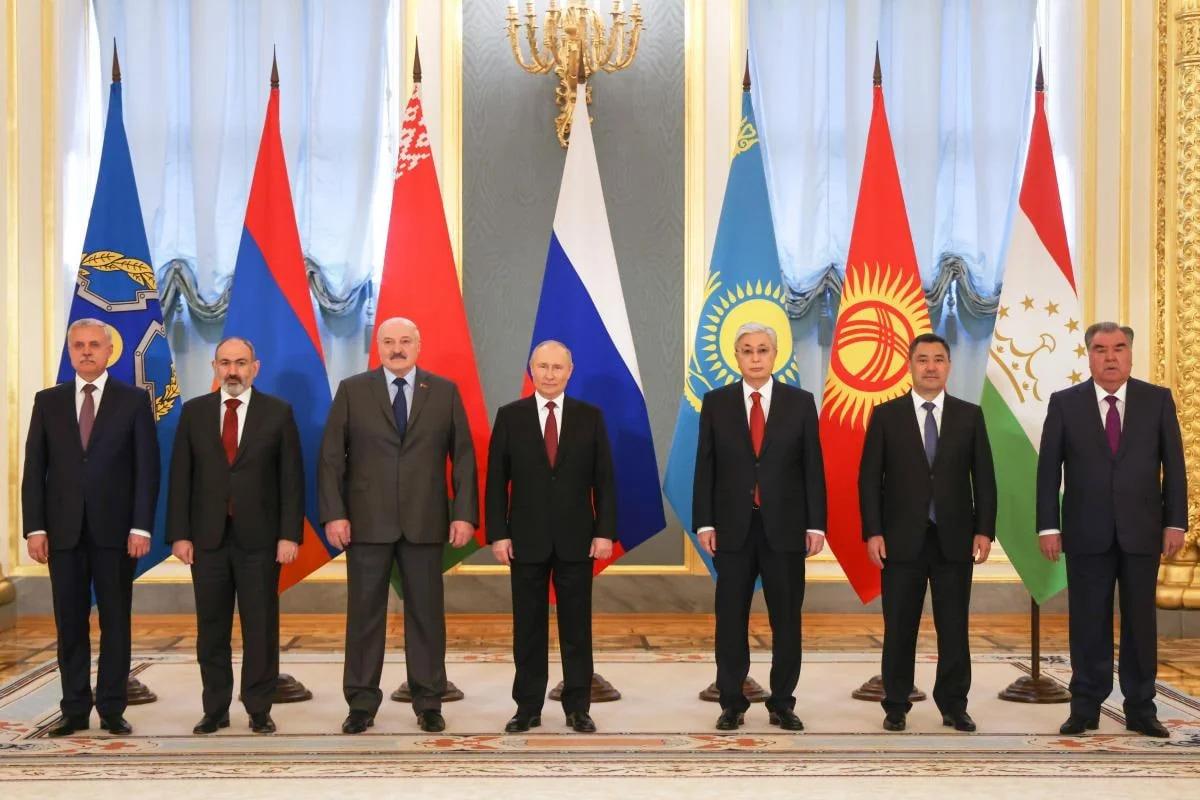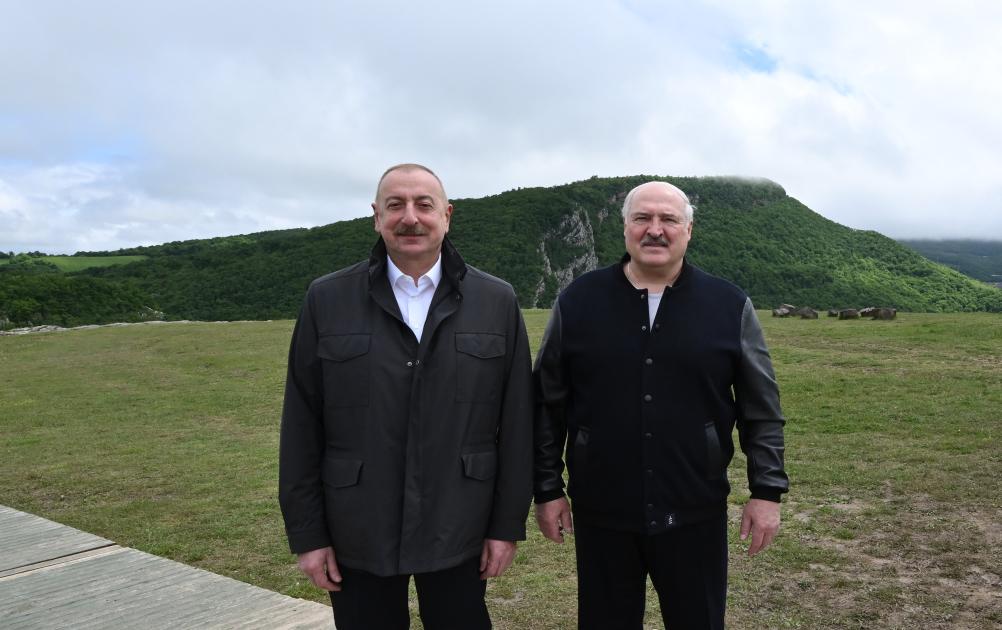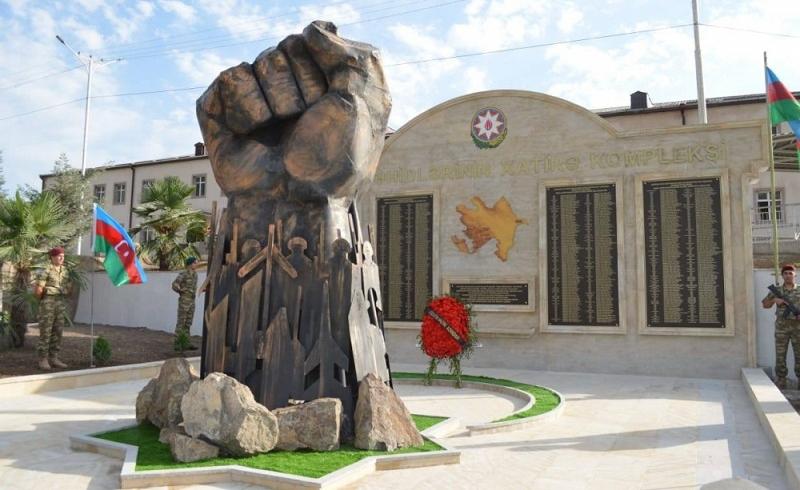Lukashenka's Azerbaijan visit highlights Aliyev's role in South Caucasus security
In charge of South Caucasus
ANALYTICS 22 May 2024 - 09:23
| Fuad Muxtar-Agbabali |
The recent visit of Belarusian President Alyaksandr Lukashenka to Azerbaijan, during which he toured the liberated cities of Fuzuli and Shusha, has sparked significant reactions in Yerevan and beyond. Lukashenka’s statements, emphasizing Azerbaijan's increasing responsibility for the security of the South Caucasus under President Ilham Aliyev, have reverberated throughout the region, underscoring the shifting dynamics in this strategically important area.
Lukashenka's visit and comments reflect a high regard for President Aliyev’s leadership. His assertion that "you are already responsible not only for Azerbaijan; you are already responsible for the situation in the Caucasus as a whole," points to an acknowledgment from Belarus - and by extension, Russia - of Azerbaijan's leading role in regional security. This recognition is particularly significant given Lukashenka's close ties with Russian President Vladimir Putin and his alignment with Russian geopolitical interests.
Implications for Armenia & Georgia
The unfolding developments in the region and the visit of the Belarus president have triggered significant concern and jealousy in Armenia, a member of the Collective Security Treaty Organization (CSTO) alongside Belarus and Russia. Armenia perceives Lukashenka's statements not merely as Minsk’s official stance but as a reflection of the Kremlin's strategic vision.

Moscow frequently utilizes Lukashenka as a proxy to communicate sensitive or potentially controversial positions, allowing Russia to test reactions and gauge the international response without directly involving itself. This method of indirect communication enables the Kremlin to avoid provoking sharp reactions from various domestic and international audiences, thereby maintaining a degree of plausible deniability and diplomatic flexibility.
On the other hand, Armenia's concern stems from the implication that Azerbaijan's enhanced role in regional security, endorsed by both Belarus and implicitly by Russia, could further marginalize Yerevan within the CSTO framework. Recognizing Azerbaijan as a primary security guarantor in the South Caucasus challenges Armenia’s traditional security reliance on the CSTO, particularly on Russia. The shift underscores a potential reconfiguration of alliances and power dynamics in the region, suggesting that Armenia might need to reconsider its strategic and diplomatic positions.
The jealousy in Yerevan is fueled by the acknowledgment of Azerbaijan's growing influence and the endorsement of Ilham Aliyev's leadership by influential CSTO members. This development suggests that Armenia's influence within the organization is waning, while Azerbaijan's role is being elevated. Consequently, Armenia faces the dilemma of aligning its policies with the broader CSTO strategy, which now appears to favor Azerbaijan's leadership in maintaining regional stability or seeking alternative alliances that might not align with CSTO interests.
Alternatively, the unfolding developments and statements imply that the behaviors of Armenia and Georgia must align with the broader interests of the South Caucasus, as deviations could pose threats not only to Azerbaijan but to regional stability as a whole.
For Georgia, this could mean navigating its relationship with Azerbaijan carefully to ensure regional cooperation. The implication is clear: regional states should prioritize collective security and stability over external alliances that may conflict with the interests of the South Caucasus.
Strategic diplomatic relations
President Ilham Aliyev’s diplomatic finesse is evident in his ability to maintain strong relations with Russia while asserting Azerbaijan's regional leadership. His relationship with Putin, characterized by mutual respect and strategic cooperation, has been crucial in securing Russian support. This support has been vital in ensuring stability in the South Caucasus, despite the complex and often volatile political environment.
Lukashenka’s statements are an endorsement of Aliyev’s leadership and a reflection of broader CSTO support for Azerbaijan’s role. This endorsement from Belarus, a country closely allied with Russia, indicates a consensus within the bloc regarding Azerbaijan's pivotal role in regional security.

President Ilham Aliyev has repeatedly emphasized the importance of regional cooperation and the need for bilateral negotiations without external mediators. His vision for a stable and secure South Caucasus is embodied in initiatives like the 3+3 format, which includes three South Caucasus countries (Azerbaijan, Armenia, and Georgia) and three neighboring powers (Russia, Turkey, and Iran). This format aims to foster peace and cooperation, presenting a united front that can address regional challenges more effectively.
Reconstruction of devastated Karabakh & regional development
Belarus’s commitment to participate in the reconstruction of the liberated territories, planning to build a 412-family settlement, is a tangible expression of support. This collaboration not only aids in the rehabilitation of war-torn areas but also strengthens bilateral ties between Azerbaijan and Belarus. It further solidifies Azerbaijan’s role as the leader in regional reconstruction efforts.
Additionally, other nations are stepping up to support the reconstruction of Karabakh, which was severely damaged during nearly 30 years of Armenian occupation. Uzbekistan has already built a school complex in Fuzuli, showcasing its commitment to aiding in the region's educational and infrastructural development. Similarly, Kazakhstan has commissioned a school complex, expressing a strong interest in participating in the reconstruction efforts, indicating a broader regional and international support network rallying behind Azerbaijan’s vision for a revitalized Karabakh.

These contributions from Uzbekistan, Kazakhstan, and potentially other nations highlight the international community's recognition of Azerbaijan’s leadership and their willingness to invest in the region’s stability and development. The reconstruction of Karabakh not only represents a physical rebuilding but also a symbolic gesture of unity and support for Azerbaijan’s sovereignty and regional security efforts.
Conclusion
Lukashenka’s visit and statements underscore a significant shift in the South Caucasus’s geopolitical landscape, with Azerbaijan under President Ilham Aliyev emerging as a key player in regional security. Ilham Aliyev’s leadership, marked by strategic diplomacy and efforts to foster stability, is increasingly recognized and supported by regional powers like Belarus and Russia. This recognition not only bolsters Azerbaijan’s position but also calls for a recalibration of strategies by neighboring states like Armenia and Georgia to align with the collective interests of the South Caucasus.
As Azerbaijan continues its efforts to rebuild and stabilize the region, Aliyev’s role as a unifying and stabilizing force will be crucial in shaping the future of the South Caucasus, ensuring peace, security, and development in this strategically vital area.
Caliber.Az
|
1
|
Armenian special forces' bold move Confiscation sparks political backlash
24 June 2024 - 17:07
|
|
2
|
Armenia’s military build-up & western alignments risk renewed conflict Baku warns Yerevan
23 June 2024 - 11:39
|
|
3
|
Steering through tangled web of conflict & peace between Azerbaijan & Armenia High time to do away with a vicious circle
23 June 2024 - 09:17
|
|
4
|
Armenia's truce violations amid rising tensions & strategic weapons deals with France Those who ignore history are bound to repeat it
23 June 2024 - 15:31
|
|
5
|
Why does Russia want to recognize the Taliban government? Graveyard of empires
25 June 2024 - 12:36
|
Presidential aide: Diplomacy without military strength akin to music without instruments
26 June 2024 - 12:17
President Aliyev receives Italian-made military transport aircraft C-27J Spartan
26 June 2024 - 12:04
Turkish authorities disrupt international drug cartel in Spain
26 June 2024 - 11:52
Azerbaijan's Air Force: Guardians of the nation's skies
PHOTO26 June 2024 - 11:40
Julian Assange pleads guilty for leaking America's national secrets
Banned from returning to US without permission26 June 2024 - 11:28
Armenia receives tenth package of proposals from Azerbaijan
26 June 2024 - 11:16
Israel accuses UN of keeping food at warehouses in Gaza
26 June 2024 - 11:04
German Bundeswehr set to secure massive munitions production contract
26 June 2024 - 10:53
Pentagon ex-advisor warns US of losing NATO ally
26 June 2024 - 10:40
Russian FM: BRICS to suspend admitting new members
26 June 2024 - 10:27
Former Swiss president elected Council of Europe chief
26 June 2024 - 10:15
Russia, Ukraine each return 90 prisoners of war
26 June 2024 - 10:02
Azerbaijan gains victory over Armenia in anti-terrorist operation rapidly, minister says
26 June 2024 - 09:50
SOCAR, Germany's VNG ink MoU for natural gas & renewable energy co-op
26 June 2024 - 09:38
Azerbaijan celebrates 106th anniversary of Armed Forces
26 June 2024 - 09:22
Azerbaijan confirms identities of 20 missing Individuals from First Karabakh War
26 June 2024 - 09:10
Climate crisis threatens West Africa's coastal cities
26 June 2024 - 09:03
Global green-energy transition faces critical challenges
26 June 2024 - 08:17
When will China have a sixth-gen fighter jet?
26 June 2024 - 06:13
China stands to gain significantly from Ukraine war
26 June 2024 - 04:10
Western economies urged to adapt to Chinese innovation in EV sector
26 June 2024 - 02:07
Macron's rightward shift backfires, bolstering far-right National Rally
26 June 2024 - 00:05
Iran’s new nuclear threat
Weaponizing threshold status25 June 2024 - 22:03
Azerbaijani Foreign Ministry congrats Slovenia on National Day
25 June 2024 - 21:14
Iranian presidential candidates discuss foreign policy in penultimate TV debate
25 June 2024 - 20:59
Baku hosts 11th consular consultations between Azerbaijani & Russian Foreign Ministries
25 June 2024 - 20:42
Iran reaffirms commitment to JCPOA, slams US & E3/EU non-compliance
25 June 2024 - 20:39
Azerbaijani foreign minister meets Russian envoy to discuss peace process with Armenia
25 June 2024 - 20:30
Federal cabinet approves national counter-terrorism plan amid opposition concerns
25 June 2024 - 20:22
Albanian parliamentary commission holds hearing for ambassador candidate to Azerbaijan
25 June 2024 - 20:08
Top official: Russia, Azerbaijan forge robust partnership
25 June 2024 - 19:30
ANAMA, EU delegation hold conference on combating mine threat
PHOTO25 June 2024 - 19:18
SOCAR, Equinor explore future collaboration
25 June 2024 - 19:06
Azerbaijan, IEA working on new nenewable energy, efficiency commitments
25 June 2024 - 18:54
Erdogan condemns Dagestan attacks in call with Putin
25 June 2024 - 18:42
Turkish, Armenian foreign ministers hold telephone conversation
25 June 2024 - 18:39
Israel’s top court rules ultra-Orthodox Jews must be drafted into military
25 June 2024 - 18:30
Estonian prime minister to become Europe's top diplomat
25 June 2024 - 18:16
Turkish FM contrasts BRICS, G7 in terms of scope and objectives
25 June 2024 - 18:04
Azerbaijan, Czech Republic sign MoC on space sphere
25 June 2024 - 17:52
